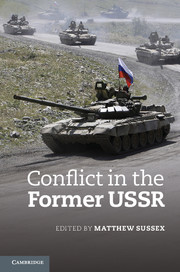Book contents
- Frontmatter
- Contents
- Maps
- Contributors
- Acknowledgements
- Abbreviations
- Map
- 1 Introduction
- 2 The return of imperial Russia
- 3 The shape of the security order in the former USSR
- 4 Great powers and small wars in the Caucasus
- 5 The Russo-Georgian war
- 6 Why not more conflict in the former USSR?
- 7 Transnational crime, corruption and conflict in Russia and the former USSR
- 8 The transformation of war?
- 9 Conclusions
- Bibliography
- Index
- References
8 - The transformation of war?
New and old conflicts in the former USSR
Published online by Cambridge University Press: 05 November 2012
- Frontmatter
- Contents
- Maps
- Contributors
- Acknowledgements
- Abbreviations
- Map
- 1 Introduction
- 2 The return of imperial Russia
- 3 The shape of the security order in the former USSR
- 4 Great powers and small wars in the Caucasus
- 5 The Russo-Georgian war
- 6 Why not more conflict in the former USSR?
- 7 Transnational crime, corruption and conflict in Russia and the former USSR
- 8 The transformation of war?
- 9 Conclusions
- Bibliography
- Index
- References
Summary
In the final years before the USSR imploded Mikhail Gorbachev spoke about a ‘coming century of peace’, characterised by increased cooperation amongst great powers, the growing significance of multilateralism and the increasing illegitimacy of military force. Distinctly different from the militaristic power politics that characterised the Cold War, this order would be defined by the global spread of democracy, accord through institutional cooperation and the declining incidence of war and conflict. However, since the collapse of the USSR in 1991 and the subsequent ending of the Cold War, varying degrees of political, economic and social chaos have plagued the post-Soviet space. In fact, this space has arguably been defined by the war and conflict that has taken place there. Whereas the high-profile conflicts that took place in Rwanda and the former Yugoslavia were identified as being representative of what post-Cold War conflict would most likely continue to look like, wars in the former Soviet space, especially those in Chechnya and Georgia, have also challenged the way we think about war and conflict. With this in mind, one is therefore moved to ask whether there has been a change in the nature and character of war. If so, how significant is this change?
These questions have particular relevance to the former Soviet geopolitical space. Indeed, the former USSR serves as a microcosm for the changes that characterise the post-Cold War order: new forms of religious and ethnic secessionist violence; identity politics; and non-traditional security threats that the new Russian state has responded to in an arguably non-traditional manner. The wars in Chechnya serve as a case in point. Conversely, the 2008 Russo-Georgian conflict bears many of the hallmarks of so-called traditional warfare. Thus, while a discussion on the changing nature of conflict and warfare can certainly be framed in a broader, global context, the geopolitical significance of the former Soviet space makes a focus on this arena especially pertinent.
- Type
- Chapter
- Information
- Conflict in the Former USSR , pp. 172 - 194Publisher: Cambridge University PressPrint publication year: 2012



